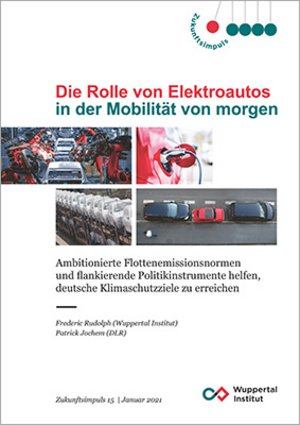Die Rolle von Elektroautos in der Mobilität von morgen
Flottenemissionsnormen und flankierende Politikinstrumente helfen, deutsche Klimaschutzziele zu erreichen

Last year, the growth in electromobility in Germany was higher than ever before. This is mainly due to the EU regulation on fleet emission standards. Electromobility has taken an important step and shown that it has the potential to replace the combustion engine soon. However, a very high market share of electric cars alone is not enough to achieve Germany's medium-term climate protection goals. This is one of the main statements of the authors of this impulse paper. They recommend that the European Union continues setting manufacturers ambitious targets for low-emission passenger cars to ensure that almost all newly registered passenger cars will be electrically powered as early as 2030. Hybrid cars are at most an important transitional technology on this path. A central prerequisite is also that the current charging processes are made easier to make the switch to vehicles with alternative drive concepts more attractive.
Frederic Rudolph, Patrick Jochem:
Die Rolle von Elektroautos in der Mobilität von morgen
Ambitionierte Flottenemissionsnormen und flankierende Politikinstrumente helfen, deutsche Klimaschutzziele zu erreichen
Wuppertal, 2021
(Zukunftsimpuls no. 15)
